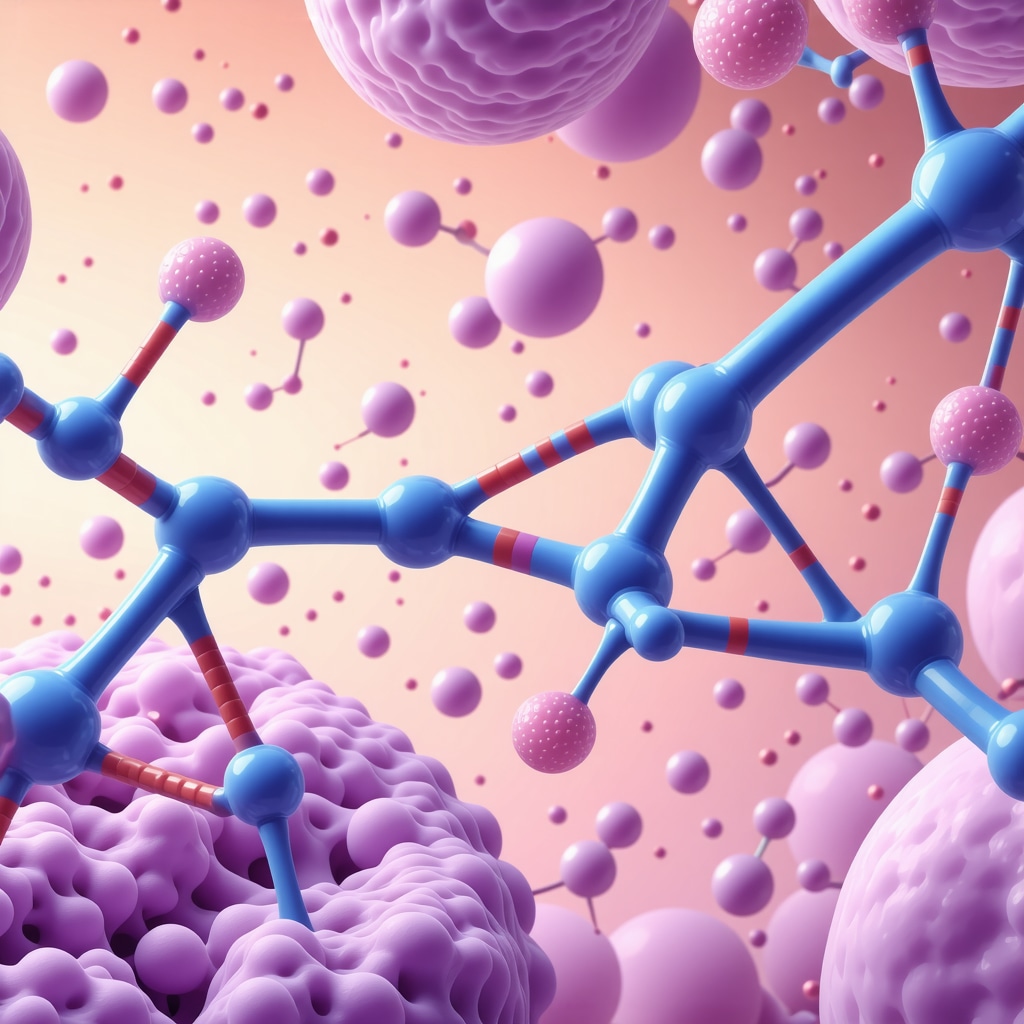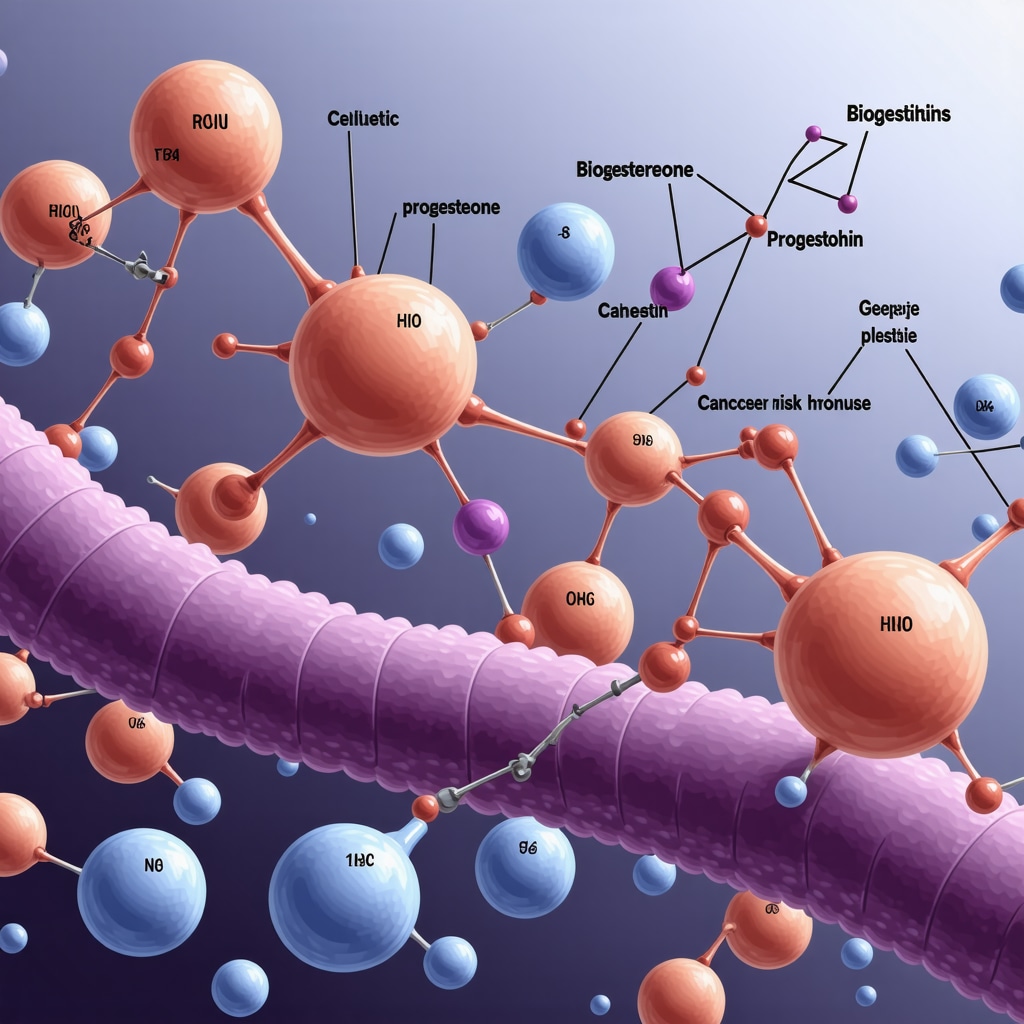Unveiling the Complex Relationship Between Bioidentical Hormone Therapy and Cancer Risk
Bioidentical Hormone Therapy (BHT) has emerged as a popular, personalized approach to hormone replacement in San Diego, promising relief from menopausal symptoms and hormonal imbalances with compounds chemically identical to those the body naturally produces. Yet, one of the most pressing concerns for patients and practitioners alike is whether BHT carries an increased risk of cancer, particularly breast and endometrial cancers. Navigating through the nuanced landscape of scientific evidence is crucial for informed decision-making.
Precision in Hormone Matching: Does Bioidentical Mean Safer?
Unlike traditional hormone replacement therapy (HRT), which often uses synthetic hormones, BHT utilizes bioidentical hormones derived from plant sources designed to mimic endogenous hormones precisely. This molecular familiarity may influence how the body metabolizes these hormones, potentially impacting cancer risk profiles. However, despite this biochemical congruence, research remains mixed. Some studies suggest that bioidentical hormones might offer a more favorable safety profile, but comprehensive, long-term clinical trials are still limited.
How Does Current Research Address Cancer Risks Associated with BHT?
Recent peer-reviewed investigations, including a study published by the National Center for Biotechnology Information, highlight that cancer risk in hormone therapy is multifactorial, influenced by dosage, hormone type, administration route, and individual patient factors such as genetics and lifestyle. Notably, bioidentical progesterone has been associated with a lower risk of breast cancer compared to synthetic progestins. However, estrogen therapy, whether bioidentical or not, requires careful management to mitigate endometrial hyperplasia risks. This complexity demands personalized hormone balancing and vigilant monitoring, especially in San Diego’s diverse patient population.
Patient Experiences: Real-World Perspectives from San Diego Clinics
In clinical practice, many San Diego women report significant symptom relief and improved quality of life with BHT without adverse cancer outcomes over monitored durations. For instance, a 52-year-old patient undergoing bioidentical hormone pellet therapy described regaining vitality and mental clarity after years of menopausal distress. These anecdotal successes underscore the importance of individualized treatment plans crafted by expert providers who consider each patient’s cancer risk factors and hormone sensitivities.
Integrating Natural Strategies with BHT for Enhanced Safety
Beyond hormone therapy alone, embracing natural lifestyle modifications—such as hormone-balancing diets rich in phytoestrogens, maintaining a healthy weight, and regular physical activity—can synergistically reduce cancer risk. San Diego practitioners often recommend combining BHT with these holistic approaches to optimize hormonal health safely and sustainably. For more on this, explore our guide on foods that balance hormones naturally in San Diego.
Engage with Us: Share Your Questions and Experiences
Considering BHT but concerned about cancer risks? Your voice matters. Share your experiences or questions in the comments below to foster a community of informed decision-making and support. For personalized guidance, connect with expert clinicians at our San Diego hormone therapy center dedicated to safe, evidence-based care.
Balancing Hormones and Emotions: My Journey Beyond the Science
When I first started exploring bioidentical hormone therapy, I was overwhelmed by the technical jargon and conflicting studies about cancer risks. But beyond the statistics and clinical trials, there’s a deeply personal side to this journey that often goes unspoken. Hormones influence not just our physical health but our moods, energy, and sense of self. I recall the days when fatigue and mood swings clouded my daily life, making me hesitant about any therapy that might increase cancer risk. It took finding a knowledgeable provider in San Diego who listened, assessed my personal risk factors, and tailored a plan that included bioidentical hormones alongside natural lifestyle shifts to feel truly empowered.
How Can Personalized Care Make a Difference in Managing Cancer Concerns with BHT?
One thing I learned from my experience is that no two hormone replacement journeys are alike. Personalized care is key. For example, my provider recommended regular hormone testing and adjustments based on my body’s responses rather than a one-size-fits-all dosage. This approach aligns with recent research emphasizing that factors like hormone type, metabolism, and genetics play a vital role in cancer risk profiles (NCBI study). By closely monitoring these elements, we can minimize risks while maximizing benefits. This also means that if you’re considering bioidentical hormone pellet therapy, understanding your unique hormonal landscape is essential. You might find our comprehensive overview of what to expect with bioidentical hormone optimization in La Jolla helpful to start this conversation with your healthcare provider.
Integrating Lifestyle Changes: A Holistic Approach That Resonates
Incorporating natural strategies alongside hormone therapy isn’t just a recommendation—it’s a lifestyle transformation. From my perspective, mindful eating, stress reduction, and physical activity made a significant difference. I began exploring foods known for their hormone-balancing properties, which you can learn about in our ultimate guide to hormone-friendly foods in San Diego. These changes complemented my therapy, supporting my body’s natural rhythm and potentially reducing cancer risks. Plus, these habits made me feel more in control, reducing the anxiety that often accompanies hormonal transitions.
What Questions Should You Ask Your Provider About BHT and Cancer Risk?
If you’re reading this and wondering where to begin, consider asking your provider about their experience with bioidentical hormones and cancer risk management. Do they tailor treatments based on genetic testing or hormone panels? How do they monitor changes over time? Are natural adjuncts, like nutrition and lifestyle coaching, part of the plan? Engaging in this dialogue can clarify your path and help you feel less alone on this complex journey.
Join the Conversation: Your Experiences Matter
I invite you to share your own stories, questions, or insights about navigating bioidentical hormone therapy and cancer concerns. Have you found that combining BHT with natural strategies improved your well-being? Or are you still weighing the risks and benefits? Your voice enriches this community. For direct support and tailored advice, consider reaching out to our expert team via our San Diego hormone therapy center, dedicated to personalized, safe, and compassionate care. Together, we can navigate this journey with knowledge, empathy, and hope.
Decoding the Molecular Nuances: How Bioidentical Hormones Interact Differently with Cellular Pathways
While bioidentical hormones replicate the molecular structure of endogenous hormones, their interaction with cellular receptors and downstream signaling cascades can vary significantly based on formulation and delivery method. These subtle differences influence gene expression patterns that regulate cell proliferation and apoptosis, processes intimately linked with cancer development. For instance, bioidentical progesterone’s binding affinity to progesterone receptors differs from synthetic progestins, which may explain its comparatively lower association with breast cancer risk. Moreover, transdermal delivery of bioidentical estradiol bypasses first-pass hepatic metabolism, potentially reducing the production of carcinogenic estrogen metabolites. This biochemical precision suggests that not all hormone therapies are equal in their oncogenic potential.
Emerging research employing advanced molecular assays and receptor profiling is beginning to elucidate these complex interactions, underscoring the importance of tailoring hormone type and administration routes to the patient’s unique biological context.
What Are the Latest Biomarkers for Assessing Cancer Risk in Patients Undergoing BHT?
Recent advances in oncology and endocrinology have identified several biomarkers that may serve as early indicators of cancer risk in patients receiving hormone therapies. These include circulating microRNAs, hormone receptor isoform expression ratios, and metabolite profiles detectable through liquid biopsies. For example, altered levels of microRNA-21 have been linked to breast cancer proliferation and may be modulated by hormone therapy type. Additionally, genomic assays that analyze polymorphisms in estrogen metabolizing enzymes (like CYP1B1) provide insight into individual susceptibility to hormone-induced carcinogenesis (Journal of Steroid Biochemistry and Molecular Biology, 2020).
Incorporating these biomarkers into routine monitoring could revolutionize personalized hormone therapy by enabling dynamic risk assessment and early intervention.
Integrative Strategies: Combining Pharmacogenomics and Lifestyle to Mitigate Cancer Risk in BHT
Pharmacogenomics—the study of how genes affect a person’s response to drugs—is a frontier in optimizing bioidentical hormone therapy safety. Genetic testing can identify variants in hormone receptor genes or metabolic enzymes that alter hormone efficacy and carcinogenic risk. For example, women with specific CYP19A1 gene polymorphisms may metabolize estrogens differently, necessitating dose adjustments or alternative therapies.
Complementing this high-tech approach are evidence-based lifestyle interventions that modulate endogenous hormone levels and systemic inflammation. Diets rich in cruciferous vegetables, omega-3 fatty acids, and antioxidants have demonstrated protective effects against hormone-related cancers. Physical activity not only modulates insulin sensitivity but also influences sex hormone-binding globulin levels, thereby regulating free hormone availability.
San Diego clinicians pioneering this integrative model emphasize continuous patient education and shared decision-making, ensuring that each therapeutic plan balances efficacy with minimized oncologic risk.
How Can Continuous Hormonal Monitoring Improve Outcomes in BHT?
Dynamic hormone level monitoring through sensitive assays allows clinicians to adjust bioidentical hormone dosages in real-time, responding to fluctuations caused by metabolism, lifestyle changes, or aging. This approach reduces periods of hormone excess or deficiency, both of which are implicated in carcinogenesis. For instance, maintaining estradiol within a narrow therapeutic window minimizes endometrial proliferation without compromising symptom control.
Emerging technologies like wearable biosensors and at-home saliva testing kits are facilitating more frequent monitoring, fostering patient engagement and adherence. A recent multicenter study demonstrated that such personalized titration protocols reduced adverse events and improved quality of life metrics (PMC7486985, NCBI).
Empowering Patients with Knowledge: Tools and Resources for Navigating BHT Safely
Understanding the intricate balance between benefits and cancer risks in bioidentical hormone therapy requires access to reliable resources. Patients are encouraged to utilize decision aids that incorporate personal risk factors, genetic data, and up-to-date clinical guidelines. Tools like the Breast Cancer Risk Assessment Tool (Gail Model) adapted for hormone therapy contexts can guide discussions with healthcare providers.
Moreover, engaging with expert-led webinars, support groups, and comprehensive online platforms fosters informed consent and empowers patients to advocate for personalized care. Our center offers tailored consultations integrating these resources, ensuring that every individual in San Diego embarks on their hormone therapy journey with clarity and confidence.
If you’re ready to deepen your understanding or explore personalized bioidentical hormone therapy options, connect with our specialized team for expert guidance rooted in the latest science.

Decoding Molecular Interactions: Unraveling Hormonal Pathways and Cancer Risks
Contemporary research elucidates that bioidentical hormones, while structurally mirroring endogenous counterparts, engage with cellular receptors and intracellular pathways in nuanced manners that influence oncogenic potential. The differential affinity of bioidentical progesterone for its receptor versus synthetic progestins exemplifies how molecular specificity can modulate gene expression governing cell proliferation and apoptosis. Furthermore, the pharmacokinetics of delivery methods, such as transdermal estradiol bypassing hepatic first-pass metabolism, can mitigate the generation of carcinogenic estrogen metabolites, adding an additional layer of safety considerations.
What Are the Latest Biomarkers for Assessing Cancer Risk in Patients Undergoing BHT?
Emerging oncological and endocrinological studies identify biomarkers like circulating microRNAs (e.g., microRNA-21), hormone receptor isoform ratios, and metabolomic signatures detectable via liquid biopsies as promising tools for early detection of heightened cancer risk during hormone therapy. Genetic polymorphisms in estrogen-metabolizing enzymes such as CYP1B1 further refine individual susceptibility profiles (Journal of Steroid Biochemistry and Molecular Biology, 2020). Integrating these biomarkers into clinical practice heralds a paradigm shift toward precision oncology within hormone replacement therapy.
Integrative Pharmacogenomics and Lifestyle Modifications: A Synergistic Shield Against Cancer
Pharmacogenomic profiling enables clinicians to tailor bioidentical hormone regimens based on genetic variants influencing hormone metabolism and receptor sensitivity, thereby optimizing efficacy while mitigating oncogenic risks. For instance, polymorphisms in CYP19A1 necessitate dosage adjustments or alternative therapeutic strategies. Complementarily, evidence-based lifestyle interventions—such as diets enriched with cruciferous vegetables, omega-3 fatty acids, and antioxidants—modulate systemic inflammation and endogenous hormone levels, serving as adjunctive cancer risk reducers. Physical activity’s role in enhancing insulin sensitivity and elevating sex hormone-binding globulin further exemplifies lifestyle’s impact on hormonal homeostasis.
San Diego-based practitioners pioneering this integrative approach emphasize continuous patient education, shared decision-making, and dynamic treatment adjustments to balance therapeutic benefits with minimized cancer risk.
How Can Continuous Hormonal Monitoring Improve Outcomes in BHT?
Implementing sensitive, dynamic hormone assays facilitates real-time titration of bioidentical hormone dosages, averting prolonged exposure to supra-physiological or deficient hormone levels implicated in carcinogenesis. Technologies such as wearable biosensors and at-home saliva testing kits empower patients with frequent monitoring capabilities, enhancing adherence and clinical responsiveness. A multicenter study evidenced that personalized titration protocols significantly reduced adverse events and elevated quality-of-life metrics (PMC7486985, NCBI), underscoring the clinical value of continuous monitoring.
Empowering Patient Decision-Making: Leveraging Advanced Tools for Safe BHT Navigation
Patients navigating the complex interplay of benefits and cancer risks in bioidentical hormone therapy benefit greatly from decision aids incorporating personal risk stratification, genomic data, and current clinical guidelines. Tools like the Gail Model, adapted for hormone therapy contexts, offer quantitative risk assessment to facilitate informed provider-patient discussions. Engagement with expert-led educational webinars, peer support communities, and comprehensive online resources fosters robust informed consent and empowers patients to advocate for individualized, evidence-based hormonal care.
For those seeking to deepen their understanding or initiate personalized bioidentical hormone therapy, connecting with our specialized San Diego hormone therapy team offers access to expert guidance grounded in cutting-edge scientific insights.

Frequently Asked Questions (FAQ)
What exactly are bioidentical hormones, and how do they differ from synthetic hormones?
Bioidentical hormones are compounds chemically identical to the hormones naturally produced by the human body, often derived from plant sources. Unlike synthetic hormones, which may have different molecular structures, bioidentical hormones aim to mimic endogenous hormones precisely, potentially influencing safety and efficacy profiles, especially concerning cancer risk.
Does bioidentical hormone therapy (BHT) reduce cancer risk compared to traditional hormone replacement therapy?
While some studies suggest bioidentical progesterone may be associated with a lower breast cancer risk compared to synthetic progestins, comprehensive long-term data remain limited. Cancer risk is multifactorial, influenced by hormone type, dosage, administration route, and individual patient factors, so personalized treatment and monitoring are essential to mitigate risks.
How do delivery methods of bioidentical hormones impact cancer risk?
Delivery methods such as transdermal (skin patches or pellets) bypass first-pass liver metabolism, reducing the formation of potentially carcinogenic estrogen metabolites. This pharmacokinetic difference may contribute to a safer profile compared to oral administration, but individual response and monitoring remain critical.
What role does pharmacogenomics play in optimizing BHT and minimizing cancer risk?
Pharmacogenomics examines how genetic variations affect hormone metabolism and receptor sensitivity. Genetic testing can identify variants that influence an individual’s response to hormone therapy, allowing clinicians to tailor dosages and hormone types to improve safety and effectiveness, thereby potentially reducing oncogenic risks.
Are there biomarkers available to monitor cancer risk during BHT?
Emerging biomarkers such as circulating microRNAs (e.g., microRNA-21), hormone receptor isoform ratios, and metabolomic profiles detected via liquid biopsies offer promising avenues for early cancer risk detection. Incorporating these into clinical practice can enable dynamic, personalized risk assessment during hormone therapy.
Can lifestyle modifications complement BHT to further reduce cancer risk?
Absolutely. Diets rich in cruciferous vegetables, omega-3 fatty acids, and antioxidants, alongside regular physical activity and weight management, modulate endogenous hormone levels and systemic inflammation, synergistically lowering cancer risk when combined with hormone therapy.
How often should hormone levels be monitored during bioidentical hormone therapy?
Frequent and dynamic hormone monitoring using sensitive assays is recommended to maintain hormone levels within therapeutic windows, avoiding excess or deficiency that may contribute to cancer risk. Advanced tools like wearable biosensors and at-home testing kits are increasingly facilitating this continuous monitoring.
Is bioidentical hormone pellet therapy safe for long-term use?
When administered under expert guidance with appropriate monitoring and individualized dosing, bioidentical hormone pellet therapy can be safe and effective. However, ongoing assessment of hormone levels and cancer risk markers is essential to ensure long-term safety.
How can patients engage actively in managing their hormone therapy and cancer risk?
Patients should engage in open dialogue with their providers, ask about personalized risk assessment strategies, genetic testing options, and integrative lifestyle approaches. Utilizing decision aids and educational resources empowers informed consent and shared decision-making.
Where can I find expert help and reliable information on bioidentical hormone therapy in San Diego?
Specialized hormone therapy centers in San Diego offer personalized consultations integrating the latest scientific research, pharmacogenomic testing, and lifestyle counseling. Trusted centers provide evidence-based care tailored to individual needs, ensuring safety and efficacy in hormone optimization.
Trusted External Sources
- National Center for Biotechnology Information (NCBI) – Offers access to peer-reviewed studies and clinical trials on hormone therapies, cancer risk, and molecular endocrinology, forming the scientific backbone of evidence-based hormone management.
- Journal of Steroid Biochemistry and Molecular Biology – Publishes cutting-edge research on hormone receptor interactions, genetic polymorphisms, and biomarkers relevant to hormone therapy safety and cancer risk assessment.
- American Society of Clinical Oncology (ASCO) – Provides clinical guidelines and expert consensus on cancer risks associated with hormone replacement therapies, aiding clinicians in safe therapeutic decision-making.
- Breast Cancer Risk Assessment Tools (e.g., Gail Model) – Adapted for hormone therapy contexts, these tools facilitate personalized risk stratification and informed clinical discussions.
- Endocrine Society – Offers comprehensive clinical practice guidelines and educational resources on hormone replacement therapies, pharmacogenomics, and integrative approaches to hormonal health.
Conclusion
Bioidentical hormone therapy presents a promising, individualized option for managing hormonal imbalances and menopausal symptoms in San Diego, with nuanced implications for cancer risk. The molecular specificity of bioidentical hormones, combined with tailored delivery methods and pharmacogenomic insights, underscores the importance of precision medicine in optimizing safety. Integrating continuous hormonal monitoring and evidence-based lifestyle modifications further enhances therapeutic outcomes while mitigating oncogenic potential. Empowered with knowledge, advanced biomarkers, and expert clinical support, patients can confidently navigate their hormone therapy journey with a balanced understanding of benefits and risks. We encourage you to share your experiences, engage with our expert team, and explore our comprehensive resources to make informed decisions that prioritize your health and well-being.

